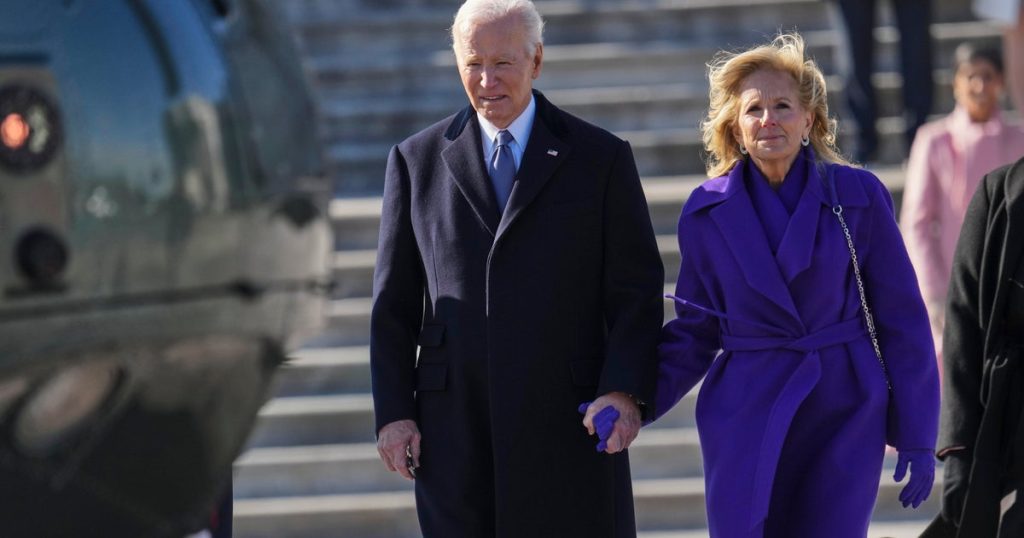Former President Joe Biden is currently under evaluation following the discovery of a “small nodule” on his prostate during a routine physical examination. The announcement was confirmed by a spokesperson on Tuesday. This health concern raises important questions about his well-being, particularly as he navigates his post-presidential life and public appearances. As testing continues, the implications of prostate health, particularly in older men, are garnering attention.
| Article Subheadings |
|---|
| 1) Discovery of Nodule During Routine Examination |
| 2) Understanding Prostate Cancer Risks |
| 3) Age and Prostate Health Concerns |
| 4) Current Health Status and Public Perception |
| 5) Implications for Future Health and Public Engagement |
Discovery of Nodule During Routine Examination
During a routine physical exam, a small nodule was found on the prostate of former President Joe Biden, prompting further evaluation. A spokesperson for Biden confirmed the discovery, which has raised concerns and curiosity within the public and medical communities alike. Initial assessments indicated that additional testing may be necessary to determine whether the nodule is a sign of prostate cancer or if it is benign. Such evaluations typically involve various diagnostic procedures, including MRI scans and potential biopsies to ascertain the nature of the nodule.
Understanding Prostate Cancer Risks
Prostate cancer remains one of the most prevalent cancers affecting men, second only to skin cancer. According to the Cleveland Clinic, a notable statistic is that one in every eight men will receive a prostate cancer diagnosis in their lifetime. The Centers for Disease Control and Prevention (CDC) reports that for every 100 men, approximately 13 will develop prostate cancer. The potential seriousness of these findings cannot be understated, as prostate health is a critical issue for many men, especially as they grow older.
Age and Prostate Health Concerns
Age is widely regarded as the most significant risk factor for prostate cancer. The CDC emphasizes that as men age, particularly those over the age of 50, their likelihood of encountering prostate health issues rises dramatically. At 82 years old, Biden exemplifies this demographic, which is generally more susceptible to developing prostate-related health problems. Understanding these demographics is critical, as awareness and early detection can substantially impact health outcomes.
Current Health Status and Public Perception
In the wake of this health revelation, Biden’s public perception is under scrutiny, especially concerning questions about his cognitive and physical health. Following his presidency, he has maintained a relatively low profile, yet he appeared recently on “The View,” addressing rumors surrounding his cognitive decline. “They are wrong,” he asserted, reinforcing a commitment to transparency about his health. This recent public engagement indicates his drive to counter any misinformation and reassure his supporters about his capabilities.
Implications for Future Health and Public Engagement
As the investigation into the prostate nodule unfolds, Biden’s health will continue to be a focal point in discussions about his potential future engagements and public appearances. With a new book set to delve into his health while in office, there is significant interest in how these revelations could shape the narratives surrounding his experiences as president. The ongoing public and media scrutiny may influence his decisions on re-entering the political arena, further feeding into the broader dialogue on health among aging politicians.
| No. | Key Points |
|---|---|
| 1 | Former President Joe Biden is undergoing evaluation following the discovery of a prostate nodule. |
| 2 | Prostate cancer is a prevalent concern, affecting one in eight men. |
| 3 | Age is a critical factor in prostate health issues. |
| 4 | Public perception of Biden’s health is being closely monitored, especially post-presidency. |
| 5 | The implications of his health will potentially affect his future public engagements. |
Summary
The recent discovery of a prostate nodule during former President Joe Biden’s routine examination has raised substantial questions regarding his health and future. As health issues among aging leaders attract attention, Biden’s case serves as a reminder of the significance of early detection and the importance of addressing health concerns candidly. The ongoing evaluation process will not only impact Biden personally but may also have wider implications for public engagement and the political landscape moving forward.
Frequently Asked Questions
Question: What are prostate nodules?
Prostate nodules are abnormal growths on the prostate gland that may indicate benign conditions or prostate cancer.
Question: How is prostate cancer diagnosed?
Diagnosis of prostate cancer typically involves blood tests, imaging techniques like MRI, and biopsies to examine tissue samples from the prostate.
Question: What are common symptoms of prostate cancer?
Symptoms may include difficulty urinating, blood in the urine, painful urination, and lower back pain, though early stages may present no symptoms at all.


